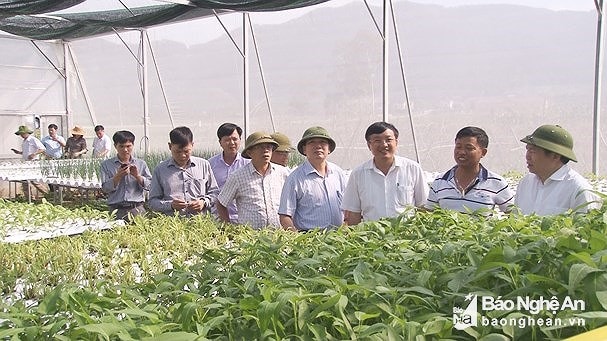Nghe An: Piloting the reinforcement of 7 officials to agricultural cooperatives
(Baonghean.vn) - Starting from June 2018, the Decision of Nghe An Provincial People's Committee approving the pilot implementation of the model of sending young university and college graduates to work for a limited period at agricultural cooperatives in the province for the period 2018 - 2020 was officially implemented.
Accordingly, a pilot program will be conducted to increase the number of university and college graduates to work for a limited period at 7 agricultural cooperatives in the area, including: Hung Nguyen Town Agricultural and Environmental Cooperative, Hung Nguyen District; Tho Thanh General Agricultural Service Cooperative, Yen Thanh District; Dien Lien Commune Agricultural Service Cooperative, Dien Chau District; Nam Cat Agricultural Service Cooperative, Nam Dan District; Nghia Thuan Agricultural Service Cooperative, Thai Hoa Town; Quynh Tam Agricultural Service Cooperative, Quynh Luu District and Nam Son Agricultural Service Cooperative, Quynh Van Commune, Quynh Luu District.
 |
| Survey of the cooperative model of clean vegetable production in Nam Dan. Photo: Document |
The officials under this decision are supported with 99,360 million VND in 3 years 2018 - 2020. The support fund is provided to the cooperative annually and paid to the officials monthly.
The purpose of this model is to enhance the professional capacity, expertise and management of cooperatives, apply scientific and technological advances in production and business; expand joint ventures and associations, organize production according to the province's key product chains... contributing to the restructuring of the agricultural sector and the province's new rural development program.
Nghe An strives to attract 40-45% of rural workers to participate in the cooperative sector by 2020; increase the rate of cooperatives operating effectively in production and business to 70-75% or more; eliminate weak cooperatives; establish 50-60 new cooperatives each year.
By 2020, 80% of communes will have at least one cooperative operating effectively according to new rural criteria; 100% of cooperative managers and professional staff will be trained in cooperative economic management; vocational training for cooperative members and workers in the cooperative sector will be 2,000 - 3,000 people/year; the average income of workers in cooperatives will increase by 15 - 20%/year.


